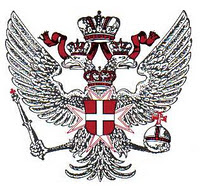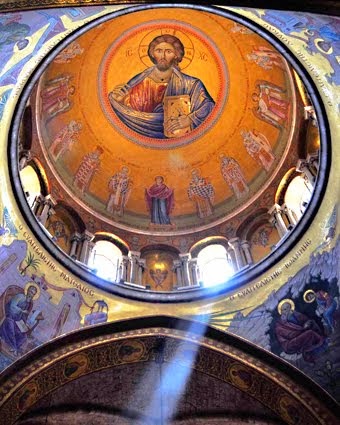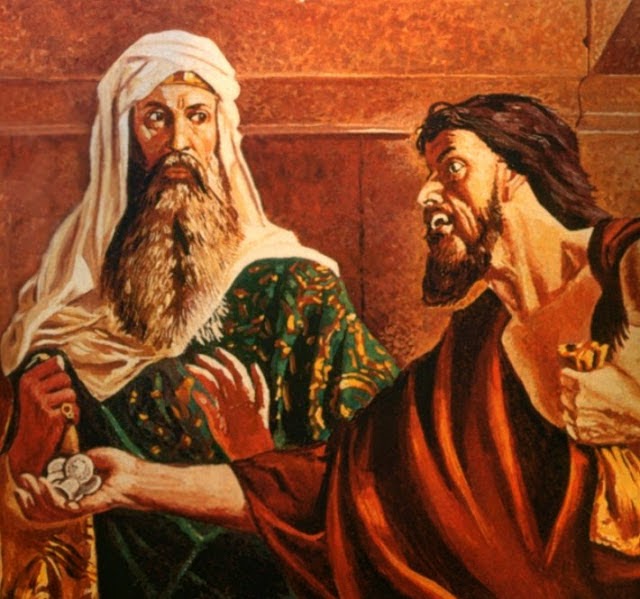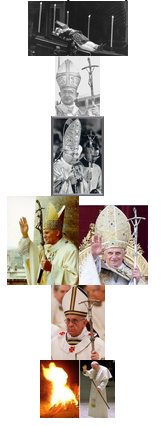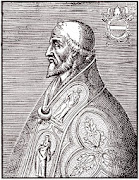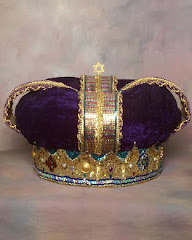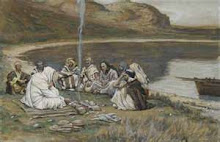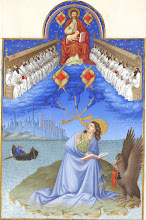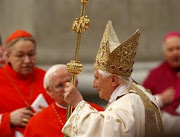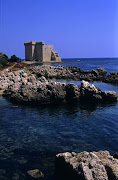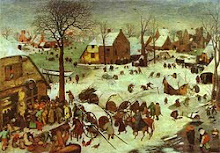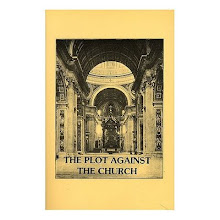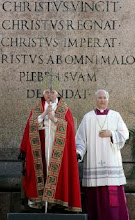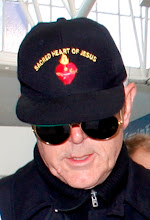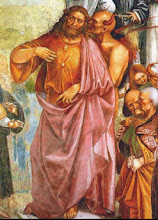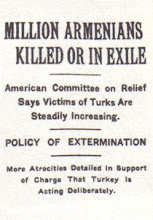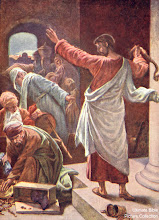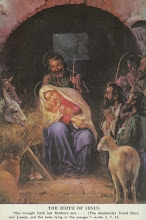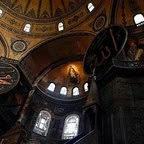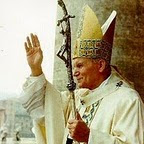St. John the Apostle and Evangelist
That which was from the beginning, which we have heard, which we have seen with our eyes, which we have looked upon, and our hands have handled, of the Word of life; (for the life was manifested, and we have seen it, and bear witness, and shew unto you that eternal life, which was with the Father, and was manifested unto us;) that which we have seen and heard declare we unto you, that ye also may have fellowship with us: and truly our fellowship is with the Father, and with his Son Jesus Christ. And these things write we unto you, that your joy may be full. This then is the message which we have heard of him, and declare unto you, that God is light, and in him is no darkness at all.
V. But do thou, O Lord, have mercy upon us.
R. Thanks be to God.
R. Right worthy of honour is the blessed Apostle John, which leaned on the Lord's bosom at the Last Supper : * To whom, a virgin, did Christ upon the Cross commit his Virgin Mother.
V. He was chosen of the Lord, as a virgin : and was beloved more than all the rest.
R. To whom, a virgin, did Christ upon the Cross commit his Virgin Mother.
If we say that we have fellowship with him, and walk in darkness, we lie, and do not the truth: but if we walk in the light, as he is in the light, we have fellowship one with another, and the blood of Jesus Christ his Son cleanseth us from all sin. If we say that we have no sin, we deceive ourselves, and the truth is not in us. If we confess our sins, he is faithful and just to forgive us our sins, and to cleanse us from all unrighteousness. If we say that we have not sinned, we make him a liar, and his word is not in us.
V. But do thou, O Lord, have mercy upon us.
R. Thanks be to God.
V. Most worthy of honor is blessed John. R. Who leaned upon the Lord's breast at the last supper.
Commemoration of the Octave of Christmas
Grant, we beseech thee, Almighty God: that the new birth in the flesh of thine only-begotten Son may set us free, who, because of the former bondage of our race, are still borne down under the yoke of sin. Through the same Jesus Christ Our Lord and Saviour who lives and reigns with thee in the unity of the Holy Spirit. Amen.
December 27 St. John the Apostle and Evangelist
Rev. Alban Butler (1711–73). Volume XII: December.
The Lives of the Saints. 1866.
December 27
St. John the Apostle and Evangelist
See Tillemont, t. 1, p. 330. Calmet, t. 7 et 8. Ceillier, t. 1, p. 364. Reading, &c.
ST. JOHN THE EVANGELIST, who is styled in the gospel, The beloved disciple of Christ,and is called by the Greeks The Divine, was a Galilean, the son of Zebedee and Salome, and younger brother to St. James the Great, with whom he was brought up to the trade of fishing. From his acquaintance with the high-priest Caiphas, St. Jerome infers that he was a gentleman by birth; but the meanness of his father’s trade, and the privacy of his fortune sufficiently prove that his birth could not much distinguish him in the world, neither could his education give him any tincture of secular learning. His acquaintance with the high-priest may be placed to some other account. Nicephorus Calixtius, a modern Greek historian of the fourteenth century, (in whom, amidst much rubbish, several curious anecdotes are found,) says, we know not upon what authority, that St. John had sold a paternal estate to Annas, father-in-law to Caiphas, a little before the death of our Lord. Before his coming to Christ he seems to have been a disciple to John the Baptist, several thinking him to have been that other disciple that was with St. Andrew, when they left the Baptist to follow our Saviour; 1 so particularly does our Evangelist relate all the circumstances, through modesty concealing his own name, as in other parts of his gospel. He was properly called to be a disciple of our Lord, with his brother James, as they were mending their nets, 2 on the same day, and soon after Jesus had called Peter and Andrew. These two brothers continued still to follow their profession, but upon seeing the miraculous draught of fishes, they left all things to attach themselves more closely to him.3Christ gave them the surname of Boanerges, or sons of thunder, 4 to express the strength and activity of their faith in publishing the law of God, without fearing the power of man. This epithet has been particularly applied to St. John, who was truly a voice of thunder in proclaiming aloud the most sublime mysteries of the divinity of Christ. He is said to have been the youngest of all the apostles, probably about twenty-five years of age, when he was called by Christ; for he lived seventy years after the suffering of his divine master. Piety, wisdom, and prudence equalled him in his youth to those who with their grey hairs had been long exercised in the practice and experience of virtue; and, by a pure and blameless life he was honourable in the world. Our divine Redeemer had a particular affection for him above the rest of the apostles; insomuch, that when St. John speaks of himself, he saith, that he was The disciple whom Jesus loved; and frequently he mentions himself by this only characteristic; which he did not out of pride to distinguish himself, but out of gratitude and tender love for his blessed Master. Humility suffered him not to mention any of his other great privileges; but tenderness and love made him never forget, but on every occasion to repeat this title which was the strongest motive to inflame his own love of his Saviour, who, without any merit on his side, had prevented him by such distinguishing love. If we inquire into the causes of this particular love of Christ towards him, which was not blind or unreasonable, the first was doubtless, as St. Austin observes, the love which this disciple bore him: secondly, his meekness and peaceable disposition, by which he was extremely like Christ himself: thirdly, his virginal purity. For St. Austin tell us 5 that, “The singular privilege of his chastity rendered him worthy of the more particular love of Christ, because being chosen by him a virgin, he always remained such.” St. Jerome scruples not to call all his other privileges and graces the recompence of his chastity, especially that which our Lord did him by recommending in his last moments his virgin mother to the care of this virgin disciple. 6 SS. Ambrose, Chrysostom, Epiphanius, and other fathers frequently make the same reflection. Christ was pleased to choose a virgin for his mother, a virgin for his precursor, and a virgin for his favourite disciple: and his church suffers only those who live perfectly chaste to serve him in his priesthood, where they daily touch and offer his virginal flesh on his holy altar. In heaven virgins follow the spotless Lamb wherever he goes. 7 Who then can doubt but purity is the darling virtue of Jesus? who feeds amongst the lilies 8 of untarnished chastity. For he who loves purity of heart, will have the king his friend. 9 Another motive of the preference which Jesus gave to this apostle in his intimacy and predilection, was his perfect innocence and simplicity without guile in his youth. Virtue in that age has peculiar charms to Christ, and is always a seed of extraordinary graces and blessings. 1
The love which Jesus bears is never barren. Of this his sufferings and death are the strongest proof. As St. John had the happiness to be distinguished by Christ in his holy love, so was he also in its glorious effects. Though these principally consisted in the treasure of interior graces and virtues, exterior tokens, helps, and comforts were not wanting. This appears from the familiarity and intimacy with which his divine master favoured him above the rest of the apostles. Christ would have him with Peter and James privy to his Transfiguration, and to his agony in the garden; and he showed St. John particular instances of kindness and affection above all the rest. Witness this apostle lying in our Saviour’s bosom at the last supper; it being then the custom among the Jews often to lie along upon couches at meals, so that one might lean his head upon the bosom of him that lay before him; which honour Christ allowed St. John. 10 No tongue certainly can express the sweetness and ardour of the holy love which our saint on that occasion drew from the divine breast of our Lord, which was the true furnace of pure and holy love. St. John repeats this circumstance several times in his gospel to show its importance, and his grateful remembrance. Every devout person in some sense is admitted to a like favour, when in heavenly contemplation he shuts his corporeal eyes to all visible things, and opens those of his soul to the invisible. When his exterior senses remain, as it were asleep and dead, his interior powers are awakened and quickened, he contemplates the bottomless abyss of the divine love, and drinks plentifully of that fountain of life. We discover in the holy scriptures a close particular friendship between St. John and St. Peter, which was doubtless founded in the ardour of their love and zeal for their divine Master. When St. Peter durst not, as it seems, says St. Jerom, propound the question to our Lord, who it was that should betray him, he by signs desired St. John to do it, whose familiarity with Christ allowed him more easily such a liberty: and our Lord gave him to understand that Judas was the wretch, though, at least, except St. John, none that were present seemed to have understood his answer, which was only given by the signal of the traitor’s dipping a morsel of bread with him in the dish. St. Chrysostom says, that when our Lord was apprehended, and the other apostles fled, St. John never forsook him. Several other ancients believe that he was that young man who followed Jesus with a linen cloth cast about his naked body; by the looseness of which he disengaged himself from the officers who otherwise would have laid hold of him, had he not made his escape by flying away naked. Some interpreters suppose this linen garment to have been a night vest which it might be customary to wear at supper, and in the night, it being then night. However, if this was St. John, he soon followed Christ again; and many imagine that he was the disciple who being known to the high-priest, got Peter admitted by the servants into the court of Caiphas. 2
Our saint seems to have accompanied Christ through all his sufferings; at least he attended him during his crucifixion, standing under his cross, owning him in the midst of arms and guards, and in the thickest crowds of his implacable enemies. Here it was that our Lord declared the assurance he had of this disciple’s affection and fidelity, by recommending with his dying words, his holy mother to his care; giving him the charge to love, honour, comfort, and provide for her with that dutifulness and attention which the character of the best and most indulgent mother challenges from an obedient and loving son. What more honourable testimony could Christ have given him of his confidence, regard, and affection, than this charge? Accordingly St. John took her to his home, and ever after made her a principal part of his care. Christ had at the same time given her to St. John for his mother, saying to her: Woman, behold thy son. Our Lord disdained not to call us all brethren, as St. Paul observes. And he recommended us all as such to the maternal care of his own mother: but amongst these adoptive sons St. John is the first-born. To him alone was given this special privilege of being treated by her as if she had been his natural mother, and of reciprocally treating her as such by respectfully honouring, serving, and assisting her in person. This was the recompence of his constancy and fervour in his divine Master’s service and love. This holy apostle though full of inexpressible grief for the death of his divine Master, yet left not the cross, and saw his side opened with a spear; was attentive to the whole mystery, and saw the blood and water issue from the wound, of which he bore record. It is believed that he was present at the taking down of our Lord’s body from the cross, and helped to present it to his most blessed mother, and afterwards to lay it in the sepulchre, watering it with abundance of tears, and kissing it with extraordinary devotion and tenderness. He may be said to have left his heart with it; for his soul was more where it loved than where it lived. 3
When Mary Magdalen and other devout women brought word that they had not found Christ’s body in the sepulchre, Peter and John ran immediately thither, and John, who was younger and more nimble, running faster, arrived first at the place. Some few days after this, St. John went a fishing in the lake of Tiberias, with other disciples; and Jesus appeared on the shore in a disguised form. St. John, directed by the instinct of love, knew him, and gave notice to Peter; they all dined with him on the shore; and when dinner was ended, Christ walked along the shore questioning Peter about the sincerity of his love, gave him the charge of his Church [Ed. note - no more so than the rest of the Apostles - Peter exercised the authority he had equally with the rest of the Apostles in preaching the Gospel with them on Pentecost, but no more so - see Acts 2:14 But Peter standing up with the eleven, lifted up his voice, and spoke to them: Ye men of Judea, and all you that dwell in Jerusalem, be this known to you, and with your ears receive my words.], and foretold his martyrdom. St. Peter seeing St. John walk behind, and being solicitous for his friend, asked Jesus what would become of him; supposing that as Christ testified a particular love for him, he would shew him some extraordinary favour. Christ checked his curiosity, by telling him that it was not his business if he should prolong John’s life till he should come [which only refers to Christ's ; which most [of a certain number of scholastic commentators - Ed. note] understand of his coming to destroy Jerusalem [except that John lived past that by over thirty years, so that is not what is meant; instead the final Apostolic witness to the Gospel is John's and no one elses, see Here - Ed. note]; an epoch which St. John survived. Some of the disciples, however, misapprehended this answer so far as to infer that St. John would remain in the body till Christ shall come to judge the world: though St. John has taken care in his gospel to tell us that no such thing was meant. After Christ’s ascension, we find these two zealous apostles going up to the temple, and miraculously healing a poor cripple. Our two apostles were imprisoned, but released again with an order no more to preach Christ, but no threats daunted their courage. 11 They were sent by the college of the apostles to confirm the converts which Philip the Deacon had made in Samaria. 12 St. John was again apprehended by the Jews with the rest of the apostles, and scourged; but they went from the council rejoicing that they were accounted worthy to suffer for the name of Jesus. 13 When St. Paul went up to Jerusalem, three years after his conversion, he saw there only St. Peter and St. James the Less, St. John being probably absent. But St. Paul going thither in the fourteenth year after his conversion, addressed himself to those who seemed to be pillars of the Church, chiefly Peter and John, who confirmed to him his mission among the infidels. 14 About that time St. John assisted at the council which the apostles held at Jerusalem in the year 51. For St. Clement of Alexandria tells us that all the apostles attended in it. That father says, that Christ at his ascension preferred St. Peter, St. James the Less, and St. John to the rest of the apostles, though there was no strife or preeminence amongst any in that sacred college, and this St. James was chosen bishop of Jerusalem. St. Clement adds, that our Lord particularly instructed these three apostles in many sacred mysteries, and that the rest of the apostles received much holy science from them. 15 4
St. John seems to have remained chiefly at Jerusalem for a long time, though he sometimes preached abroad. Parthia is said to have been the chief scene of his apostolical labours. St. Austin sometimes quotes his first epistle under the title of his epistle to the Parthians: 16 and by a title then prefixed to it in some copies it seems to have been addressed to the Jews that were dispersed through the provinces of the Parthian empire. Certain late missionaries in the East Indies assure us, that the inhabitants of Bassora, a city upon the mouth of the Tigris and Euphrates, on the Persian gulf, affirm, by a tradition received from their ancestors, that St. John planted the Christian faith in their country. He came to Jerusalem in the year 62 to meet the rest of the apostles who were then living, when they chose in council St. Simeon, bishop of that church after the martyrdom of St. James the Less. 17 It seems to have been after the death of the Blessed Virgin that St. John visited Lesser Asia, making those parts his peculiar care, and residing at Ephesus, the capital of that country. It is certain that he was not come thither in 64, when St. Paul left St. Timothy bishop of that city. St. Irenæus tells us, 18 that he did not settle there till after the death of SS. Peter and Paul. St. Timothy continued still bishop of Ephesus till his martyrdom in 97. But the apostolical authority of St. John was universal and superior, and the charity and humility of these two holy men prevented all differences upon account of their jurisdiction. St. John preached in other parts, and took care of all the churches of Asia, which St. Jerom 19 says he founded and governed. Tertullian adds 20 that he placed bishops in all that country; by which we are to understand that he confirmed and governed those which SS. Peter and Paul had established, and appointed others in many other churches which he founded. It is even probable that in the course of his long life he put bishops into all the churches of Asia: for while the apostles lived, they supplied the churches with bishops of their own appointing, by the guidance of the Holy Ghost, and by virtue of their commission to plant the Church. 5
St. John, in his extreme old age, continued often to visit the churches of Asia, and sometimes undertook journeys to assume to the sacred ministry a single person whom the Holy Ghost had marked out to him. 21 Apollonius, not the Roman senator, apologist and martyr, but a Greek father who wrote against the Montanists, and confuted their pretended prophecies step by step, about the year 192, assures us, that St. John raised a dead man to life at Ephesus. 22 A certain priest of Asia having been convicted of writing a fabulous account of the voyages of St. Paul and St. Thecla, in defence and honour of that apostle, was deposed by St. John. 23 St. Epiphanius affirms, that St. John was carried into Asia by the special direction of the Holy Ghost, to oppose the heresies of Ebion and Cerinthus. The former of these, soon after the destruction of Jerusalem, whilst the Christians who had fled from that city resided at Pella, taught at Kacerta in that neighbourhood, of which he was a native, that Christ was created like one of the angels, but greater than the rest: that he was conceived and born in the natural way, and chosen to be the Son of God by the Holy Ghost descending upon him in the form of a dove. He pretended that the legal ceremonies were necessarily to be observed with the gospel, and he mutilated the gospel of St. Matthew. 24 Cerinthus raised great disturbances in obstinately defending an obligation of circumcision, and of abstaining from unclean meats, in the New Law, and in extolling the angels, as the authors of nature, before St. Paul wrote his epistles to the Colossians, &c. About the time of the destruction of Jerusalem, he framed his heretical system so as to make it akin to that of Ebion. St. Irenæus and Tertullian inform us, that he pretended the world was not created by God, but by a certain virtue, quite distinct, without his knowledge; that the God of the Jews was only an angel; that Jesus was born of Joseph and Mary like other men, but surpassed others in virtue and wisdom; that the Holy Ghost descended upon him after his baptism in the likeness of a dove; and that he had manifested his Father to the world who was before unknown. He was the first author of the dream that Christ fled away at the time of the passion, and that Jesus alone suffered and rose again, Christ continuing always immortal and impassible. St. Irenæus 25 relates, that St. John, who ordinarily never made use of a bath, went to bathe on some extraordinary occasion, but understanding that Cerinthus was within, started back, and said to some friends that were with him: “Let us, my brethren, make haste and be gone, lest the bath, wherein is Cerinthus the enemy of the Truth, should fall upon our heads.” Dr. Conyers Middleton, in his posthumous works, pretends this anecdote must be false, because inconsistent with this apostle’s extraordinary meekness. But St. Irenæus tells us, he received this account from the very mouth of St. Polycarp, St. John’s disciple, whose behaviour to Marcion is an instance of the same spirit. This great apostle would teach his flock to beware of the conversation of those who wilfully corrupted the truth of religion, and by their ensnaring speeches endeavoured to seduce others. This maxim he inculcates in his second epistle, 26 but this precaution was restrained to the authors of the pestilential seduction. Nevertheless, the very characteristic of St. John was universal meekness and charity towards all the world. But towards himself he was always most severe, and St. Epiphanius tells us, that he never wore any clothes but a tunic and a linen garment, and never ate flesh; and that his way of living was not unlike that of St. James bishop of Jerusalem, who was remarkable for austerity and mortification. 27 6
In the second general persecution, in the year 95, St. John was apprehended by the proconsul of Asia, and sent to Rome, where he was miraculously preserved from death when thrown into a caldron of boiling oil. 28 On account of this trial the title of martyr is given him by the fathers, who say, that thus was fulfilled what Christ had foretold him, that he should drink of his cup.29The idolaters who pretended to account for such miracles by sorcery, blinded themselves to this evidence; and the tyrant Domitian banished St. John into the isle of Patmos, one of the Sporades in the Archipelago. In this retirement the apostle was favoured with those heavenly visions which he has recorded in the canonical book of the Revelations, or of the Apocalypse: they were manifested to him on a Sunday in the year 96. The first three chapters are evidently a prophetic instruction given to seven neighbouring churches of Asia Minor; and to the bishops who governed them. The three last chapters celebrate the triumph of Christ, the judgment and reward of his saints. The intermediate chapters are variously expounded, either of the immediate preludes of the last judgment, or with Abbé Chetardie of the whole intermediate time from Christ to the end of the world; or with Bossuet, Calmet, and many others, of the ten general persecutions and the Roman empire to the triumph of the church by the victory of Constantine over Licinius, upon which system whatever author is read, the masterly strokes with which Bossuet has illustrated his commentary ought not to be passed over. By these visions God gave St. John a prospect of the future state of the church. His exile was not of long continuance. For Domitian being slain in September in 96, all his edicts and public acts were declared void by a decree of the senate on account of his excessive cruelty; and his successor Nerva recalled all those whom he had banished. St. John therefore returned to Ephesus in 97, where he found that St. Timothy had been crowned with martyrdom on the preceding 22d of January. The apostle was obliged by the pressing entreaties of the whole flock to take upon him the particular government of that church, which he held till the reign of Trajan. St. John, in imitation of the high-priest of the Jews, wore a plate of gold upon his forehead, as an ensign of his Christian priesthood, as Polycrates informs us. 30 St. Epiphanius relates the same of St. James, the bishop of Jerusalem, 31 and the author of the history of the martyrdom of St. Mark the Evangelist attributes to him the same ornament. St. John celebrated the Christian Pasch on the 14th day of the moon, agreeing as to time with the Jewish passover; 32 but was so far from holding the Jewish rites of obligation in the New Law, that he condemned that heresy in the Nazarites, and in Ebion and Cerinthus. As his apostolic labours were chiefly bestowed among the Jews, he judged such a conformity, which was then allowable, conducive to their conversion. 7
The ancient fathers inform us, 33 that it was principally to confute the blasphemies of Ebion and Cerinthus who denied the divinity of Christ, and even his pre-existence before his temporal birth, that St. John composed his gospel. Another reason was, to supply certain omissions of the other three gospels, which he read and confirmed by his approbation. 34 He therefore principally insists on the actions of Christ from the commencing of his ministry to the death of the Baptist, wherein the others were sparing; and he largely records his discourses, mentioning fewer miracles. It being his principal aim to set forth the divinity of Christ, he begins with his eternal generation, and his creating the world; and both his subject and manner of treating it is so sublime and mysterious, that Theodoret calls his gospel, “a theology which human understanding can never fully penetrate and find out.” Hence he is compared by the ancients to an eagle, soaring aloft within the clouds, whither the weak eye of man is unable to follow him; and by the Greeks he is honoured with the title of The Divine. St. Jerom relates, 35 that, “when he was earnestly pressed by the brethren to write his gospel, he answered he would do it, if by ordering a common fast they would all put up their prayers together to God; which being ended, replenished with the clearest and fullest revelation coming from heaven, he burst forth into that preface: In the beginning was the Word, &c.” St. Chrysostom 36 and other fathers mention that the evangelist prepared himself for this divine undertaking by retirement, prayer, and contemplation. Some think he wrote his gospel in the isle of Patmos: but it is the more general opinion that he composed it after his return to Ephesus, about the year of our Lord 98, of his age ninety-two, after our Lord’s ascension sixty-four. This apostle also wrote three epistles. The first is Catholic, or addressed to all Christians, especially his converts, whom he presses to purity and holiness of manners, and he cautions them against the crafty insinuations of seducers, especially the Simonians and Cerinthians. The other two epistles are short, and directed to particular persons: the one a lady of honourable quality; called, as it seems, Electa, (though some think this rather an epithet of honour than a proper name,) the other Gaius or Caius a courteous entertainer of all indigent Christians; rather one of that name at Derbe, mentioned in the Acts of the Apostles, 37 than the Caius of Corinth of whom St. Paul speaks.38 The style and sentiments in St. John’s gospel and in these epistles are the same; and the same inimitable spirit of charity reigns throughout all these writings. 8
The largest measures of this charity with which our apostle’s breast was inflamed, he expressed in the admirable zeal which he showed for the souls of men; in which service he spent himself without ever being weary in journeys, in preaching, in enduring patiently all fatigues, breaking through all difficulties and discouragements, shunning no dangers that he might rescue men from error, idolatry, or the snares of vice. A remarkable instance is recorded by Clement of Alexandria and Eusebius. 39 When St. John returned from Patmos to Ephesus, he made a visitation of the churches of Lesser Asia to correct abuses, and supply them with worthy pastors. Coming to a neighbouring city, after having made a discourse, he observed a young man in the company, of a fair stature, and pleasing aspect, and being much taken with him he presented him to the bishop, whom he had ordained for that see, saying: “In the presence of Christ, and before this congregation, I earnestly recommend this young man to your care.” The bishop took the trust upon him, and promised to discharge it with fidelity. The apostle repeated his injunction, and went back to Ephesus. The young man was lodged in the bishop’s house, instructed, kept in good discipline, and at length baptized and confirmed by him. When this was done, the bishop, as if the person had been now in a state of security, began to slacken the reins, and be less watchful over him. This was quickly perceived by a company of idle, debauched wretches, who allured the youth into their society. By bad company he soon forgot the precepts of the Christian religion, and passing from one degree of wickedness to another, at length stifled all remorse, put himself at the head of a band of robbers, and, taking to the highway, became the most cruel and profligate of the whole band. Some time after, St. John was again called to the same city, and when he had settled other affairs, said to the bishop, “Restore to me the trust which Jesus Christ and I committed to you in presence of your church.” The bishop was surprised, imagining he meant some trust of money. But the saint explained himself that he spoke of the young man, and the soul of his brother which he had entrusted to his care. Then the bishop, with sighs and tears, said: “Alas! he is dead.” “What did he die of?” said our saint. The bishop replied, “He is dead to God, is turned robber, and instead of being in the church with us, he hath seized on a mountain, where he lives with a company of wicked men like himself.” The holy apostle having heard this, rent his garments, and fetching a deep sigh, said, with tears, “Oh! what a guardian have I provided to watch over a brother’s soul!” Presently he called for a horse and a guide, and rode away to the mountain where the robber and his gang kept their rendezvous; and being made prisoner by their sentinels he did not offer to fly or beg his life, but cried out, “It is for this I am come: lead me to your captain.” They conducted the saint to him, who stood at first armed to receive him: but when he saw it was St. John, was seized with a mixture of shame and fear, and began to make off with precipitation and confusion. The apostle forgetting his feebleness and old age, pursued him full speed, and cried out after him in these words: “Child, why do you thus fly from me your father, unarmed and an old man? My son, have compassion on me. There is room for repentance: your salvation is not irrecoverable. I will answer for you to Jesus Christ. I am ready most willingly to lay down my life for you, as Jesus Christ laid down his life for all men. I will pledge my soul for yours. Stay: believe me I am sent by Christ.” At these words, the young man stood still, with his eyes fixed upon the ground; then throwing away his arms he trembled and burst into tears. When the apostle came up, the penitent, bathed in tears, embraced his tender father, imploring forgiveness, but he hid his right hand which had been sullied with many crimes. By his sighs and bitter compunction, he endeavoured to satisfy for his sins as much as he was able, and to find a second baptism, in his tears, as our author, St. Clement, emphatically expresses it. The apostle, with wonderful condescension and affection, fell on his knees before him, kissed his right hand, which the other endeavoured in confusion to conceal, gave him fresh assurances of the divine pardon, and earnestly praying for him, brought him back to the church. He continued some time in that place for his sake, praying and fasting with him and for him, and comforting and encouraging him with the most affecting passages of the holy scriptures. Nor did he leave the place till he had reconciled him to the church, that is, by absolution restored him to the participation of the sacraments. 9
This charity, which our great saint was penetrated with and practised himself, he constantly and most affectionately pressed upon others. It is the great vein that runs through his sacred writings, especially his epistles, where he urges it as the great and peculiar law of Christianity, without which all pretensions to this divine religion are vain and frivolous, useless and insignificant; and this was his constant practice to his dying day. St. Jerom relates, 40 that when age and weakness grew upon him at Ephesus so that he was no longer able to preach or make long discourses to the people, he used always to be carried to the assembly of the faithful by his disciples with great difficulty; and every time said to his flock only these words: “My dear children, love one another.” When his auditors, wearied with hearing constantly the same thing, asked him why he always repeated the same words, he replied, “Because it is the precept of the Lord, and if you comply with it you do enough.” An answer, says St. Jerom, worthy the great St. John, the favourite disciple of Christ, and which ought to be engraved in characters of gold, or rather to be written in the heart of every Christian. St. John died in peace at Ephesus, in the third year of Trajan, (as seems to be gathered from Eusebius’s chronicle,) that is, the hundredth of the Christian era, or the sixty-sixth from our Lord’s crucifixion, the saint being then about ninety-four years old, according to St. Epiphanius. 41 Some amongst the ancients pretend that St. John never died, but are very well confuted by St. Jerom and St. Austin. The same opinion has been revived by James Le Fevre d’Etaples 42 and Florentinius, 43 whom Tillemont has accurately refuted. 44 St. John was buried on a mountain without the town. The dust of his tomb was carried away out of devotion, and was famous for miracles, as St. Austin,45 St. Ephreme, 46 and St. Gregory of Tours 47 mention. A stately church stood formerly over this tomb, which is at present a Turkish mosque, though Mr. Wheeler tells us that there are not at present above fifty Turkish families, and no Christian in that town, once so famous. The 26th of September is consecrated to the memory of St. John in the Greek church; and in the Latin the 27th of December. 10
The great love which this glorious saint bore to his God and Redeemer, and which he kindled from his master’s divine breast, inspired him with the most vehement and generous charity for his neighbour. Without the sovereign love of God no one can please him. He that loveth not, knoweth not God, for God is charity. 48 Let us therefore love God, because God first loved us. 49 This is the first maxim in a spiritual life, which this apostle most tenderly inculcates. The second is that our fidelity in shunning all sin, and in keeping all God’s commandments is the proof of our love for God, 50 but especially a sincere love for our neighbour is its great test.For he that loveth not his brother whom he seeth, how can he love God whom he seeth not? says St. John. 51 Our blessed Redeemer, in the excess of his boundless charity for all men, presses this duty upon all men, and, as an infinitely tender parent, conjures all his children to love one another even for his sake. He who most affectionately loves them all, will have them all to be one in him, and therefore commands us to bear with one another’s infirmities, and to forgive one another all debts or injuries, and, as much as in us lies, to live peaceably with all men. 52 This is the very genius and spirit of his law, without which we can have nothing of a Christian disposition, or deserve the name of his children or disciples. Neither can we hope with a peevish, passionate, or unforgiving temper ever to be heirs of heaven. Harmony, goodness, unanimity, mutual complacency, and love, will be the invariable temper of all its blessed inhabitants. No ruffling passion, no unfriendly thought will ever be found amongst them. Those happy regions are the abode of everlasting peace and love. We must learn and cultivate this temper of heaven here on earth, or we can never hope to get thither. We are all professedly travelling together towards that blessed place, where, if we are so happy as to meet, we shall thus cordially embrace each other. Does not this thought alone suffice to make us forget little uneasinesses, and to prevent our falling out by the way? St. John teaches us that to attain to this heavenly and Christian disposition, to this two-fold charity towards God and towards our neighbour for his sake, we must subdue our passions, and die to the inordinate love of the world and ourselves. His hatred and contempt of the world was equal to his love of God, and he cries out to us: My little children, love not the world, nor the things which are in the world. If any one loves the world the charity of the Father is not in him. An excessive love of the world (whether of its pleasure, interest, or vanity and preferment) is a general temptation of mankind, and if predominant or unconquered, strongly tends to extinguish in the heart all love and relish for spiritual things. When men are in a full and precipitant career after the things of this world, they first forget God, and then forsake him. A man can never lift up that heart to God which is already chained to the earth. This vice when in power is of all others the most bewitching, and inconceivably withdraws a soul from God. Those who live in the world must, by their assiduity in the private devotional exercises of reading, meditation, and prayer, keep up an acquaintance with God and their own souls; they must frequently amidst their business recall their serious thoughts, recover and strengthen the pious frames of their minds: or their charity will soon suffer shipwreck. 11
Note 1. John i. 37. S. Chrys. hom. 17, in Joan. S. Epiph. hær. 51. [back]
Note 2. Matt. iv. 2. [back]
Note 3. Luke v. 11. [back]
Note 4. Mark iii. 17. [back]
Note 5. S. Aug. Hom. 124, in Joan. [back]
Note 6. S. Hier. l. 1, in Jovinian. c. 14. [back]
Note 7. Apoc. xiv. 4. [back]
Note 8. Cant. [back]
Note 9. Prov. xxi. 11. [back]
Note 10. John xiii. 25. [back]
Note 11. Acts iv. 19. [back]
Note 12. Ibid. viii. 14. [back]
Note 13. Ibid. v. 41. [back]
Note 14. Gal. ii. 9. Acts xv. [back]
Note 15. Clem. Alex. ap. Eus. Hist. l. 2, c. 1, p. 44, ed. Cantab. [back]
Note 16. S. Aug. Quæst. Evang. l. 3, c. 39. [back]
Note 17. Eus. l. 3, c. 11, p. 105. [back]
Note 18. S. Iren. l. 3, c. 3. [back]
Note 19. S. Iren. l. 3, c. 3. [back]
Note 20. Tert. l. 4, cont. Marcion. c. 5. [back]
Note 21. Eus. l. 3, c. 23. [back]
Note 22. Apollon. ap. Eus. Hist. l. 5, c. 18. [back]
Note 23. Tert. de Baptismo, c. 17. S. Hier. in Catal. [back]
Note 24. See St. Irenæus, Tertullian, St. Epiphanius, St. Jerom, Fleury. l. 2, n. 42. [back]
Note 25. S. Iren. l. 3, c. 3. Eus. l. 3, c. 28, p. 123, ed. Cantabar. [back]
Note 26. 2 John 10. [back]
Note 27. S. Epiph. Hær. 30. [back]
Note 28. Tert. Præs. c. 36. S. Aug. et S. Hier. passim, &c. [back]
Note 29. Matt. xx. 23. See St. James’s Life, July 25, vol. 7. [back]
Note 30. Polycr. ap. Eus. Hist. l. 5, c. 24, p. 243, ed. Cant. See Annot. Valesii, ib. [back]
Note 31. S. Epiph. in Hær. Nazaræon et Hær. 78. [back]
Note 32. S. Irenæus, l. 3, c. 12. Polycrates, ap. Eus. l. 5. c. 24. [back]
Note 33. S. Chrys. in Gal. c. 1. Clem. Alex. ap. Eus. l. 6, c. 14. S. Hier. in Cat. et Prol. in Matt. &c. [back]
Note 34. Eus. l. 3, c. 4. S. Hier. in Cat. et Clem. Alex. ap. Eus. l. 6, c. 14. S. Epiph. &c. [back]
Note 35. S. Hier. Prolog. in Matt. t. 4, p. 3, ed. Ben. [back]
Note 36. S. Chrys. Hom. 67, &c. [back]
Note 37. Acts xx. 4. [back]
Note 38. Rom. xvi. 23. [back]
Note 39. Clem. Alex. Tr. Quis Dives salvabitur. Eus. Hist. l. 3, c. 23, p. 113, ed. Cantab. S. Chrysost. l. 1, ad Theodor. Laps. [back]
Note 40. S. Hier. in Galat. c. 6. [back]
Note 41. S. Epiph. hær. 51, c. 12. [back]
Note 42. Faber Stapul. Diss. de unâ ex tribus Mariâ, fol. 82. [back]
Note 43. Florentinius, Not. in Martyr. vetus Hieronimi. [back]
Note 44. Tillem. Vie de S. Jean Evang. t. 1, art. 10, 11, Note 15–18. See Calmet, Diss. sur la Mont, de S. Jean l’Evang. t. 7, p. 615, ed. in fol. [back]
Note 45. S. Aug. hom. 124, in Joan. [back]
Note 46. S. Ephr. Ant. ap. Phot. Cod. 229. [back]
Note 47. S. Greg. Tur. l. 1, de Glor. Mart. c. 30. [back]
Note 48. 1 John iv. 8. [back]
Note 49. Ib. i. 19. [back]
Note 50. 1 John c. iii. iv. &c. [back]
Note 51. Ib. iv. 20. [back]
Note 52. Heb. xii. 14. Rom. xii. 18. [back]

























